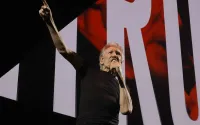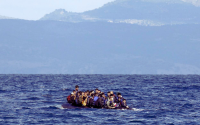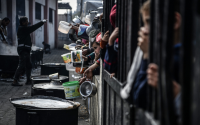December 13, 2010
Labour Party representatives who had visited the Ofer military tribunal in the West Bank two weeks ago expressed shock over how the court conducts its hearings. In a parliamentary debate about detained Palestinian minors, they said that given a sample of 100 children, 69 said soldiers beat them and kicked them when they were being arrested. The children were better off pleading guilty regardless of whether they had done something, because if they were detained until the end of proceedings, this could be three times longer than their punishment, the parliamentarians said.
The Labour legislators cited data they had received from the Palestinian branch of Defense For Children International.
This is not the Israeli Labor Party. The visitors at Ofer were members of the British Labour Party. It was not Israel's parliamentarians who spent an hour and a half debating a subject that shows the face of Israeli society, but rather their British counterparts.
In a debate December 7, Labour MP Sandra Osborne said that she and three of her colleagues had spent four days touring the West Bank under the auspices of the Council for Arab-British Understanding.
"It was a visit to a military court ... that shocked us to the core," she said.
Another member of her faction, Richard Burden, added: "I thought that the area had lost its capacity to shock me." But he realized he had made a mistake "when I saw the military court and what went on there."
The visiting MPs were sitting in one of the caravans - the halls of the court - when they "heard a jangle of chains outside the door of the courtroom," Osborne continued. "Army officers led child detainees into the military courtroom. The children's legs were shackled, they were handcuffed and they were all kitted out in brown jumpsuits. One had to wonder if the soldiers felt threatened by 13- and 14-year-old boys."
During the proceedings, she said, "The judge never once looked at the children or spoke to them."
Burden said of the shackled children, "It hit me. It hit me even more to be told by an observer, a brave Israeli woman [a member of Machsom Watch] who monitors what goes on in such courtrooms week in and week out, that what we saw was better than normal. The children came in handcuffed with their hands in front of them but all too often their hands are cuffed behind their backs."
Burden called what he saw in the occupied territories "a dual system of law based on nationality. Few Israeli settlers are charged with offenses committed in the occupied West Bank, but when they are, they are prosecuted in regular civilian courts within the State of Israel. Palestinians who are arrested, however, have to go to military courts and are held in military prison. That applies to children as well as adults.
"The minimum age for criminal responsibility is the same for Israelis and Palestinians; in both cases it is 12.
However, the minimum age for a full custodial sentence in the Israeli civil system is 14 and in the Israeli military system it is 12. The age of majority for Israelis is 18 but for Palestinians it is 16."
Burden has difficulty accepting the fact that the Israeli judicial system has different values for how long Israeli or Palestinian children may be left in detention until they are brought before a judge, and for the number of months they can be held until the end of proceedings.
A Conservative MP, Guto Bebb, came faithfully to Israel's defense. He said Osborne had said most of the children were accused of throwing stones but, he asked, what about those who were "involved in shootings, throwing Molotov cocktails or attacking military vehicles? Is it not the case that, in a civilized society, putting someone on trial for such behavior is a reasonable response?"
Bebb continued: "I do not believe for one second that Israel would behave in that way unless it was faced with an insurrection that puts its citizens in danger, and that insurrection is unfortunately utilizing young people in the Palestinian territories."
Parliamentary Under Secretary of State for Foreign and Commonwealth Affairs Alistair Burt closed the debate with a speech that showed he had done his homework. He knew even that after 40 years of occupation Israel had set up a military court for youth, and he called on Israel to respect international law that stated that 18, not 16, was the age of majority. He noted his country's friendship with Israel and its support for Israel's right to exist in security, condemned Hamas for not respecting human rights in Gaza, mentioned abducted soldier Gilad Shalit, praised the Palestinian Authority for its security forces' actions but took it to task for its treatment of detainees, and also mentioned B'Tselem reports about the arrest of minors.
The British government, he said, asks the Israeli government about issues that concern it.
"Too often, we do not receive formal responses to our lobbying," he noted. "When we do, the responses often fail to address our concerns in detail, pointing to the prevailing security situation - for example, demonstrations in the West Bank that turn violent - and stressing that Israel strives to follow due process."
He noted that he too considered the dual judicial system to be wrong and added: "As we have heard, many convictions are based on confessions, either from the defendants themselves seeking a shorter sentence under plea bargaining or from the evidence of minors facing detention. Access to lawyers is often restricted."
All those arrested are entitled to a fair trial, he said, adding that he, like Osborne, would continue to follow developments.






